专题04 短文改错 九年级下册英语期末专项训练 牛津译林版(含解析)
文档属性
| 名称 | 专题04 短文改错 九年级下册英语期末专项训练 牛津译林版(含解析) | 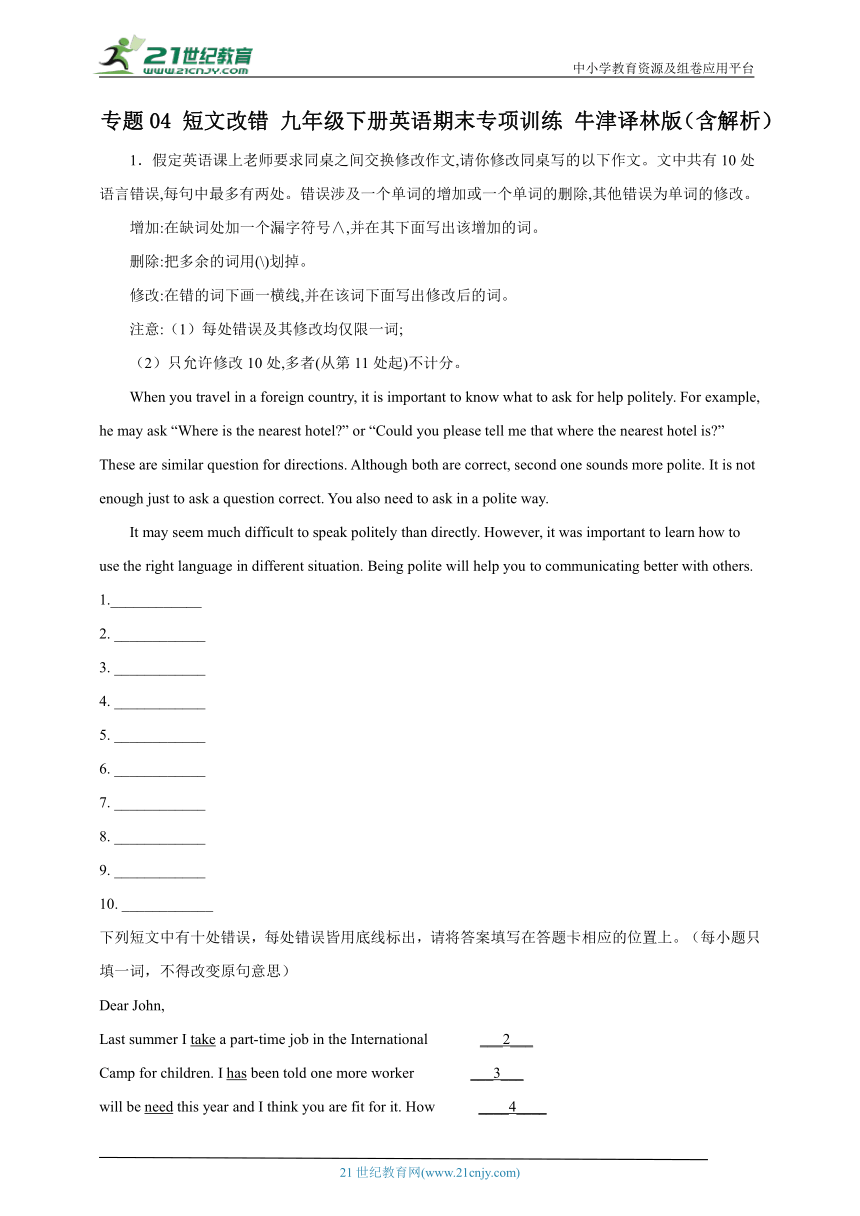 | |
| 格式 | doc | ||
| 文件大小 | 924.1KB | ||
| 资源类型 | 试卷 | ||
| 版本资源 | 牛津译林版 | ||
| 科目 | 英语 | ||
| 更新时间 | 2023-05-30 15:52:37 | ||
图片预览

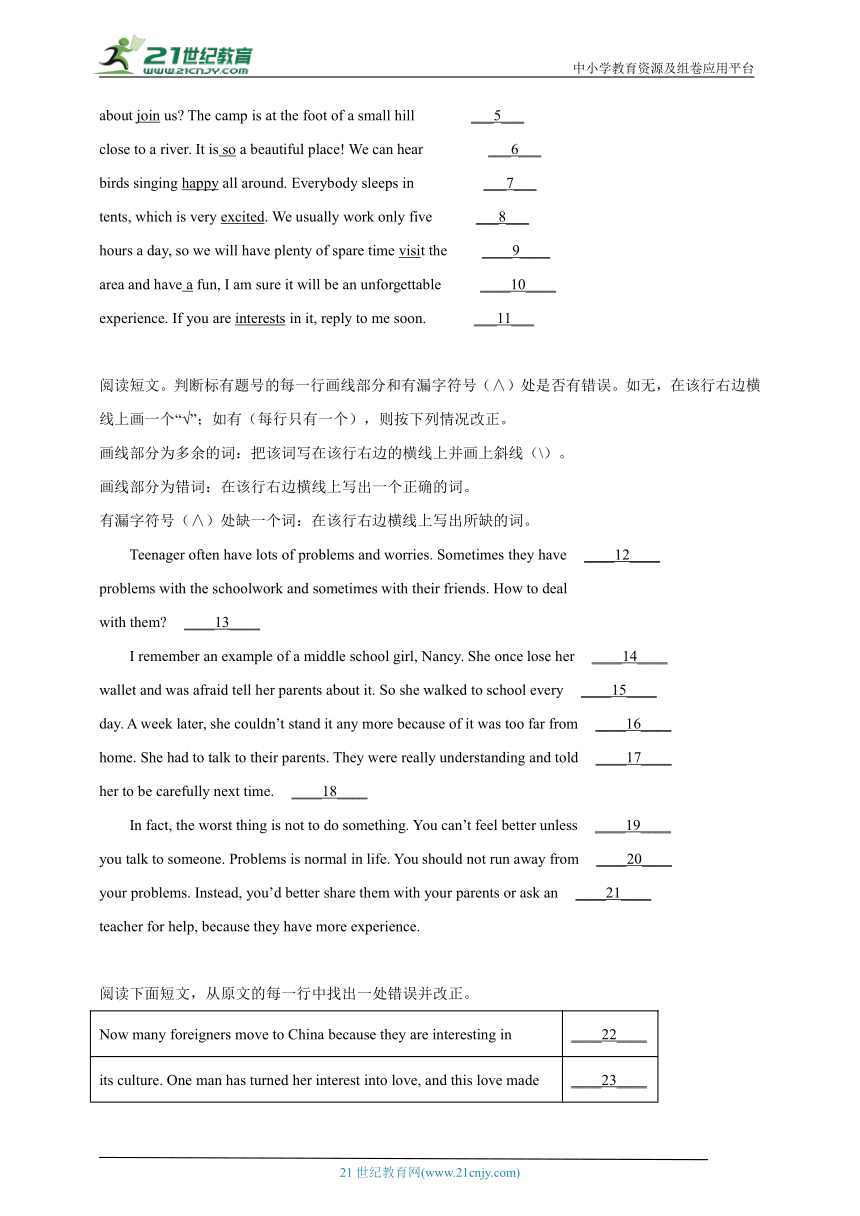
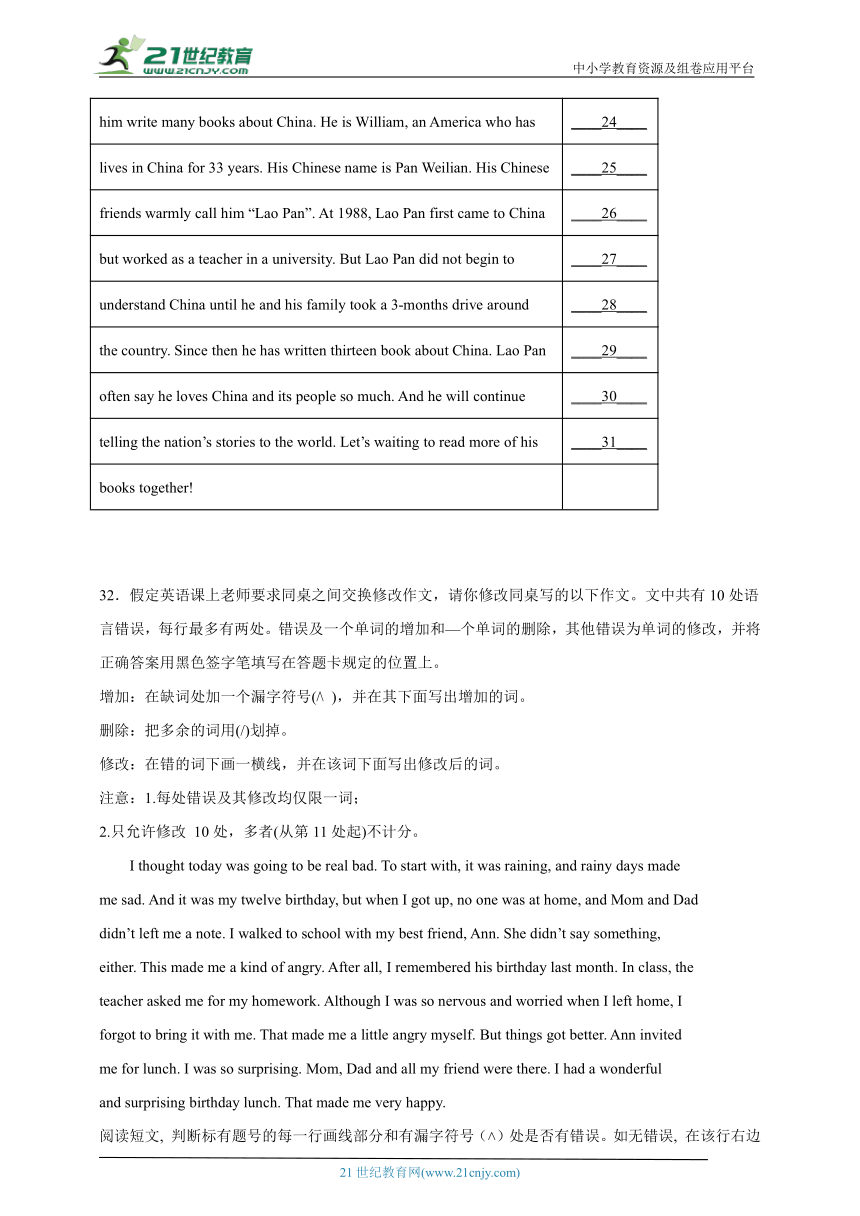
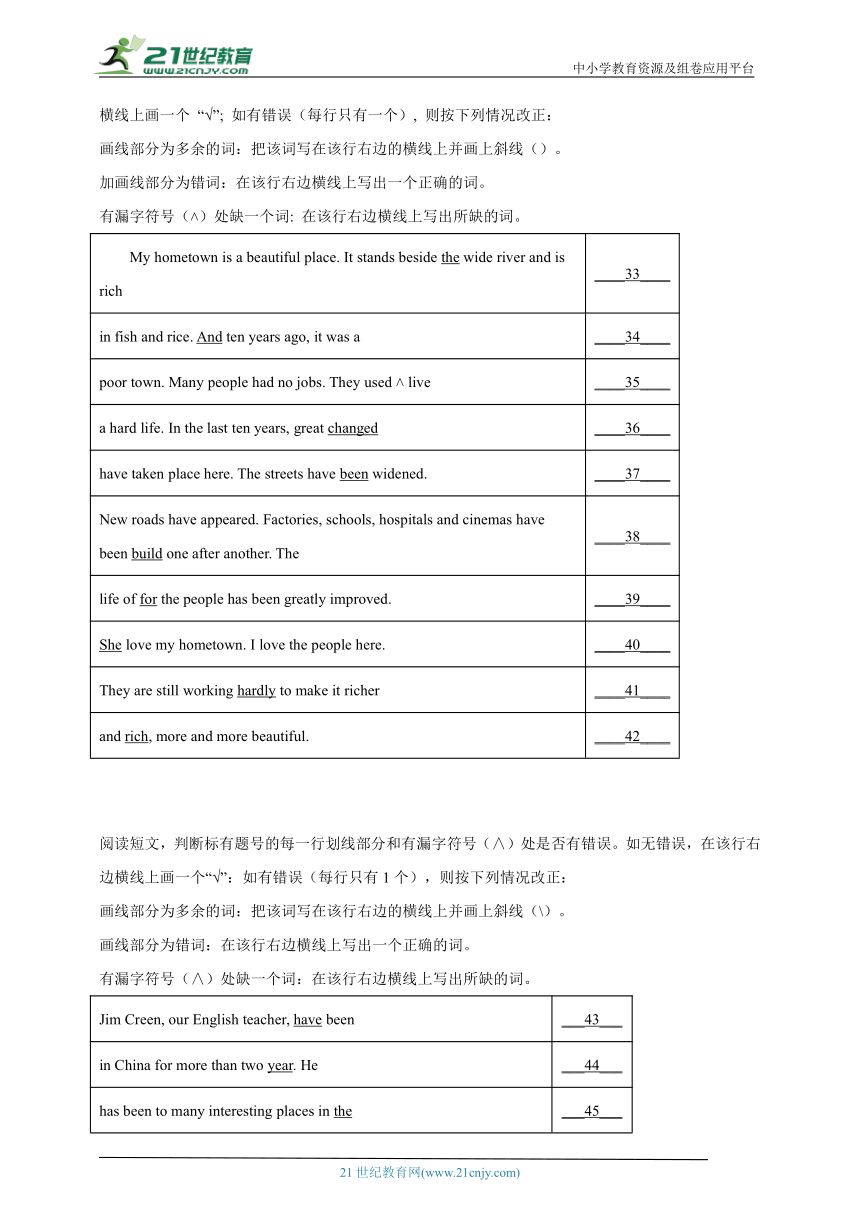
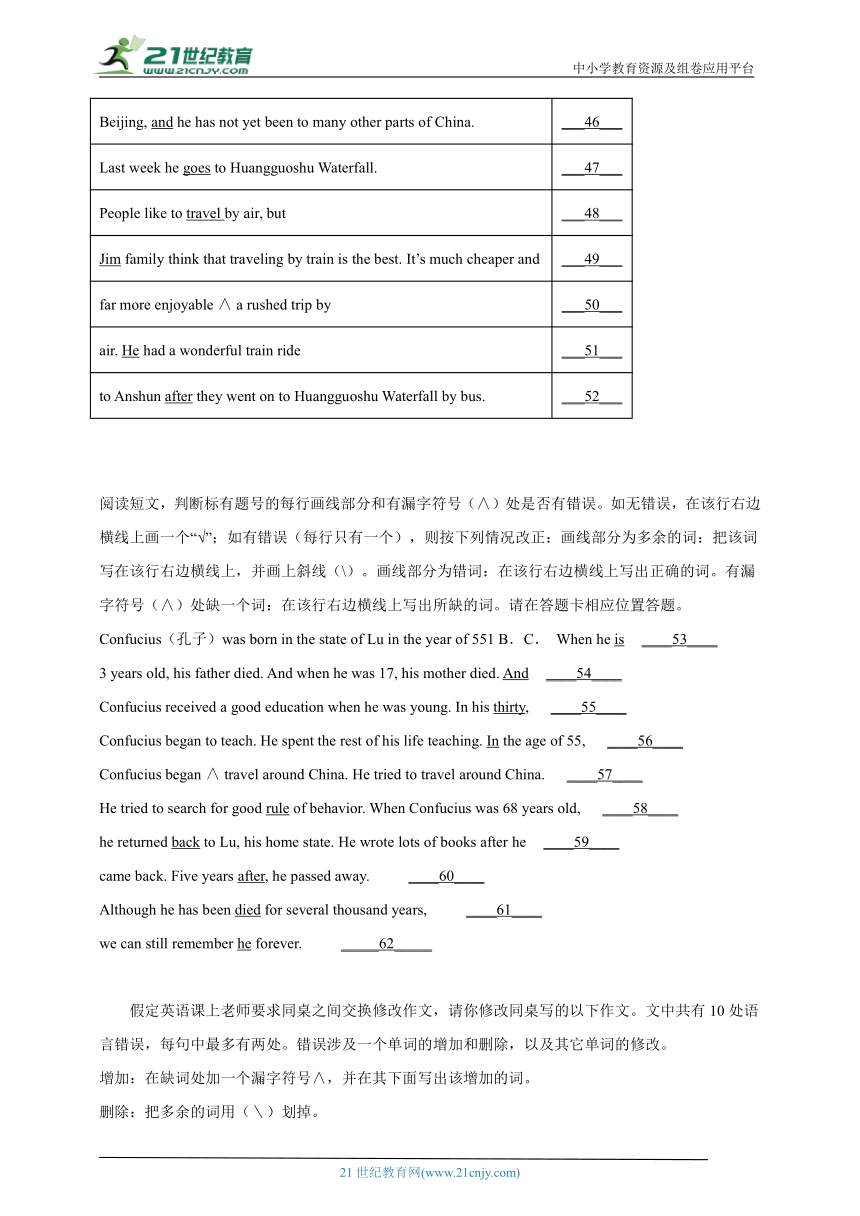
文档简介
中小学教育资源及组卷应用平台
专题04 短文改错 九年级下册英语期末专项训练 牛津译林版(含解析)
1.假定英语课上老师要求同桌之间交换修改作文,请你修改同桌写的以下作文。文中共有10处语言错误,每句中最多有两处。错误涉及一个单词的增加或一个单词的删除,其他错误为单词的修改。
增加:在缺词处加一个漏字符号∧,并在其下面写出该增加的词。
删除:把多余的词用(\)划掉。
修改:在错的词下画一横线,并在该词下面写出修改后的词。
注意:(1)每处错误及其修改均仅限一词;
(2)只允许修改10处,多者(从第11处起)不计分。
When you travel in a foreign country, it is important to know what to ask for help politely. For example, he may ask “Where is the nearest hotel ” or “Could you please tell me that where the nearest hotel is ” These are similar question for directions. Although both are correct, second one sounds more polite. It is not enough just to ask a question correct. You also need to ask in a polite way.
It may seem much difficult to speak politely than directly. However, it was important to learn how to use the right language in different situation. Being polite will help you to communicating better with others.
1.____________
2. ____________
3. ____________
4. ____________
5. ____________
6. ____________
7. ____________
8. ____________
9. ____________
10. ____________
下列短文中有十处错误,每处错误皆用底线标出,请将答案填写在答题卡相应的位置上。(每小题只填一词,不得改变原句意思)
Dear John,
Last summer I take a part-time job in the International ___2___
Camp for children. I has been told one more worker ___3___
will be need this year and I think you are fit for it. How ____4____
about join us The camp is at the foot of a small hill ___5___
close to a river. It is so a beautiful place! We can hear ___6___
birds singing happy all around. Everybody sleeps in ___7___
tents, which is very excited. We usually work only five ___8___
hours a day, so we will have plenty of spare time visit the ____9____
area and have a fun, I am sure it will be an unforgettable ____10____
experience. If you are interests in it, reply to me soon. ___11___
阅读短文。判断标有题号的每一行画线部分和有漏字符号(∧)处是否有错误。如无,在该行右边横线上画一个“√”;如有(每行只有一个),则按下列情况改正。
画线部分为多余的词:把该词写在该行右边的横线上并画上斜线(\)。
画线部分为错词:在该行右边横线上写出一个正确的词。
有漏字符号(∧)处缺一个词:在该行右边横线上写出所缺的词。
Teenager often have lots of problems and worries. Sometimes they have ____12____
problems with the schoolwork and sometimes with their friends. How to deal
with them ____13____
I remember an example of a middle school girl, Nancy. She once lose her ____14____
wallet and was afraid tell her parents about it. So she walked to school every ____15____
day. A week later, she couldn’t stand it any more because of it was too far from ____16____
home. She had to talk to their parents. They were really understanding and told ____17____
her to be carefully next time. ____18____
In fact, the worst thing is not to do something. You can’t feel better unless ____19____
you talk to someone. Problems is normal in life. You should not run away from ____20____
your problems. Instead, you’d better share them with your parents or ask an ____21____
teacher for help, because they have more experience.
阅读下面短文,从原文的每一行中找出一处错误并改正。
Now many foreigners move to China because they are interesting in ____22____
its culture. One man has turned her interest into love, and this love made ____23____
him write many books about China. He is William, an America who has ____24____
lives in China for 33 years. His Chinese name is Pan Weilian. His Chinese ____25____
friends warmly call him “Lao Pan”. At 1988, Lao Pan first came to China ____26____
but worked as a teacher in a university. But Lao Pan did not begin to ____27____
understand China until he and his family took a 3-months drive around ____28____
the country. Since then he has written thirteen book about China. Lao Pan ____29____
often say he loves China and its people so much. And he will continue ____30____
telling the nation’s stories to the world. Let’s waiting to read more of his ____31____
books together!
32.假定英语课上老师要求同桌之间交换修改作文,请你修改同桌写的以下作文。文中共有10处语言错误,每行最多有两处。错误及一个单词的增加和—个单词的删除,其他错误为单词的修改,并将正确答案用黑色签字笔填写在答题卡规定的位置上。
增加:在缺词处加一个漏字符号( ),并在其下面写出增加的词。
删除:把多余的词用(/)划掉。
修改:在错的词下画一横线,并在该词下面写出修改后的词。
注意:1.每处错误及其修改均仅限一词;
2.只允许修改 10处,多者(从第11处起)不计分。
I thought today was going to be real bad. To start with, it was raining, and rainy days made
me sad. And it was my twelve birthday, but when I got up, no one was at home, and Mom and Dad
didn’t left me a note. I walked to school with my best friend, Ann. She didn’t say something,
either. This made me a kind of angry. After all, I remembered his birthday last month. In class, the
teacher asked me for my homework. Although I was so nervous and worried when I left home, I
forgot to bring it with me. That made me a little angry myself. But things got better. Ann invited
me for lunch. I was so surprising. Mom, Dad and all my friend were there. I had a wonderful
and surprising birthday lunch. That made me very happy.
阅读短文, 判断标有题号的每一行画线部分和有漏字符号( )处是否有错误。如无错误, 在该行右边横线上画一个 “√”; 如有错误(每行只有一个), 则按下列情况改正:
画线部分为多余的词:把该词写在该行右边的横线上并画上斜线()。
加画线部分为错词:在该行右边横线上写出一个正确的词。
有漏字符号( )处缺一个词: 在该行右边横线上写出所缺的词。
My hometown is a beautiful place. It stands beside the wide river and is rich ____33____
in fish and rice. And ten years ago, it was a ____34____
poor town. Many people had no jobs. They used live ____35____
a hard life. In the last ten years, great changed ____36____
have taken place here. The streets have been widened. ____37____
New roads have appeared. Factories, schools, hospitals and cinemas have been build one after another. The ____38____
life of for the people has been greatly improved. ____39____
She love my hometown. I love the people here. ____40____
They are still working hardly to make it richer ____41____
and rich, more and more beautiful. ____42____
阅读短文,判断标有题号的每一行划线部分和有漏字符号(∧)处是否有错误。如无错误,在该行右边横线上画一个“√”:如有错误(每行只有1个),则按下列情况改正:
画线部分为多余的词:把该词写在该行右边的横线上并画上斜线(\)。
画线部分为错词:在该行右边横线上写出一个正确的词。
有漏字符号(∧)处缺一个词:在该行右边横线上写出所缺的词。
Jim Creen, our English teacher, have been ___43___
in China for more than two year. He ___44___
has been to many interesting places in the ___45___
Beijing, and he has not yet been to many other parts of China. ___46___
Last week he goes to Huangguoshu Waterfall. ___47___
People like to travel by air, but ___48___
Jim family think that traveling by train is the best. It’s much cheaper and ___49___
far more enjoyable ∧ a rushed trip by ___50___
air. He had a wonderful train ride ___51___
to Anshun after they went on to Huangguoshu Waterfall by bus. ___52___
阅读短文,判断标有题号的每行画线部分和有漏字符号(∧)处是否有错误。如无错误,在该行右边横线上画一个“√”;如有错误(每行只有一个),则按下列情况改正:画线部分为多余的词:把该词写在该行右边横线上,并画上斜线(\)。画线部分为错词:在该行右边横线上写出正确的词。有漏字符号(∧)处缺一个词:在该行右边横线上写出所缺的词。请在答题卡相应位置答题。
Confucius(孔子)was born in the state of Lu in the year of 551 B.C. When he is ____53____
3 years old, his father died. And when he was 17, his mother died. And ____54____
Confucius received a good education when he was young. In his thirty, ____55____
Confucius began to teach. He spent the rest of his life teaching. In the age of 55, ____56____
Confucius began ∧ travel around China. He tried to travel around China. ____57____
He tried to search for good rule of behavior. When Confucius was 68 years old, ____58____
he returned back to Lu, his home state. He wrote lots of books after he ____59____
came back. Five years after, he passed away. ____60____
Although he has been died for several thousand years, ____61____
we can still remember he forever. _____62_____
假定英语课上老师要求同桌之间交换修改作文,请你修改同桌写的以下作文。文中共有10处语言错误,每句中最多有两处。错误涉及一个单词的增加和删除,以及其它单词的修改。
增加:在缺词处加一个漏字符号∧,并在其下面写出该增加的词。
删除:把多余的词用(\)划掉。
修改:在错的词下画一横线,并在该词下面写出修改后的词。
注意:
1. 每处错误及其修改均仅限一词;
2. 请在答题卡的指定位置上答题;
3. 只允许修改10处,多者(从第11处起)不计分。
Last week, Mr. King came to Beijing by plane. On he first day, he rode a bike to the Great Wall and stayed there for five hour. On Tuesday, he went to Wangfujing Street to do some shopping. On Wednesday, he watched Peking Opera and eat Peking Duck. Then, he spent two days visit many famous places in Tianjin. He was surprising at the development of China.
Mr. King said, "The high-speed trains are so fast. You can go to much places you want. Everything is very convenient at here. People's life is good than before. Chinese people are kind but friendly. So I want to make friends with them. I have good time in China."
63.__________
64.__________
65.__________
66.__________
67.__________
68.__________
69.__________
70.__________
71.__________
72.__________
Where did the word “hello” come from There are all kinds of ideas.
Some say it came from a French word “ho”. This greeting may have arrived at England during the Norman
A
Conquest(诺曼征服)in the year 1066. “Ho” then changed slowly over the years and became today’s “hello”.
B
Another story of this word says it came from the word “hallo”. People often used “hallo” in England in 1300s.
C
200 years later, in William Shakespeare’s times, “hallo” had become “hello” and sailors and hunters used sounds like
D
“horllo” and “hollo”.
A Brooklyn college professor reported what he had found the true story behind the word “hello”. He said the
E
American inventor, Thomas Edison, created it. The professor said that at first Edison used the word “hullo” when
F G
working on his sound recording machine, later, when Edison became interesting in the telephone, he changed the
H
word. The professor also offered evidence for his idea. He found a letter written by Thomas in 1877 to a
I
businessman in the city Pittsburgh, Pennsylvania. Pittsburgh was about to get a telephone system. In the letter, Edison suggested to use the word “hello”.
J
73.__________
74.__________
75.__________
76.__________
77.__________
参考答案:
1. what→how he→you 删除that question→questions ^second→the second correct→correctly much→more was→is situation→situations communicating→communicate
【分析】本文是一篇说明文,就在国外旅行时如何礼貌地进行提问给出了建议。
【详解】1. 根据下文ask for help politely可知,此处应该说的是“怎样礼貌地求助”,故疑问词应用how“怎么样”,而不是what“什么”。故答案为what→how。
2. 根据上文When you travel in a foreign country可知,此处作者以第二人称向读者提出建议,故人称应用you“你”,而不是he“他”。故答案为he→you。
3. 根据原文Could you please tell me that where the nearest hotel is可知,本句为宾语从句,出现了两个引导词,即that和where,其中where“在哪里”在从句中作地点状语,符合句子结构,故不作从句成分的that应删除。故答案为“删除that”。
4. 根据上文These are提示,本句宾语question应用复数形式。故答案为question→questions。
5. second是序数词,前边通常要加定冠词the。故答案为^second→the second。
6. 根据原文It is not enough just to ask a question correct可知,此处应用形容词correct的副词形式,修饰动词ask。故答案为correct→correctly。
7. 根据原文It may seem much difficult to speak politely than directly可知,句中than提示此处有比较,故difficult应用比较级形式,即more difficult,应该将much改为more。故答案为much→more。
8. 通读全文可知,作者在给予读者建议,所用时态均为现在时,故原文中However, it was important to learn …中的was表一般过去时,应改为is的一般现在时。故答案为was→is。
9. 根据前面的different“不同的”提示,可数名词situation应用复数形式。故答案为situation→situations。
10. help sb. to do sth.为固定搭配,意为“帮助某人做某事”,故原文help you to communicating中的communicating应用动词原形,即communicate。故答案为communicating→communicate。
2.take—took 3.has—have
4.need—needed 5.join—joining 6.so—such 7.happy—happily 8.excited—exciting 9.visit—to visit 10.去掉a 11.interests—interested
【导语】本文介绍了夏令营活动的时间地点及其活动的住所,信中邀请对方去参加这次夏令营,并指出了参加夏令营很有趣,可能是一次难忘的经历。
2.Last summer I take a part-time job in the International Camp for children.去年夏天我在国际儿童夏令营做了一份兼职。根据句中时间状语“Last summer”可知应用一般过去时,故take应改为过去式took。
3.I has been told我被告知,主语是第一人称,故谓语应用have been told,故has改为have。
4.one more worker will be need this year今年将还需要一个工人,工人是被需要,应用一般将来时的被动语态结构“will be +动词过去分词”,故将need改为过去分词needed。
5.How about join us 加入我们怎么样,How about句型结构,about是介词,后接动名词,故将join改成joining。
6.It is so a beautiful place!这是一个如此美丽的地方!so修饰形容词,such修饰名词,“a beautiful place”是名词,故将so改成such。
7.We can hear birds singing happy all around.我们能听到鸟儿在四周欢快地歌唱。表达鸟高兴地唱,此处用副词happily修饰动词singing。故将happy改成happily。
8.Everybody sleeps in tents, which is very excited.每个人都睡在帐篷里,这是非常兴奋的。此处是指“Everybody sleeps in tents”这件事,非常激动,修饰物,应用exciting。故将excited改成exciting。
9.so we will have plenty of spare time visit the area 所以我们可以有大量空闲时间参观该区域,此处是表目的,表示可以参观这些地方。因此用不定式短语作目的状语,故将visit改成to visit。
10. have a fun玩得开心,fun是不可数名词,前面不能加冠词。故将a去掉。
11.If you are interests in it如果你对它感兴趣,此处考查固定短语“be interested in对……感兴趣”,故将interests改成interested。
12.Teenager—Teenagers 13.√ 14.lose—lost 15.afraid后增加to 16.去掉of 17.their—her 18.carefully—careful 19.something—anything 20.is—are 21.an—a
【导语】本文通过举例子的方式讲述了青少年在面对问题和担忧时,要向父母或老师求助,而不是逃避它们或什么也不做。
12.Teenager often have lots of problems and worries.“青少年经常有很多问题和担忧。”句子的时态为一般现在时,由谓语动词“have”可知,主语要用复数形式。故填Teenager—Teenagers。
13.How to deal with them “如何处理它们?”该句语法正确。故填√。
14.She once lose her wallet and was afraid tell her parents about it.“有一次她丢了钱包,不敢告诉父母。”由“once”和“was”判断时态为一般过去时,故动词要用过去式。故填lose—lost。
15.She once lose her wallet and was afraid tell her parents about it.“有一次她丢了钱包,不敢告诉父母。”be afraid to do sth.“害怕做某事”,固定表达。故填afraid后增加to。
16.A week later, she couldn’t stand it any more because of it was too far from home.“一个星期后,她再也无法忍受了,因为离家太远了。”根据“it was too far from home”是句子可知,应用because引导原因状语从句,because of后接名词性短语。故填:去掉of。
17.She had to talk to their parents.“她不得不和父母谈谈。”由“She”可知,此处指“她的”父母,应用形容词性物主代词her。故填their—her。
18.They were really understanding and told her to be carefully next time.“他们真的很善解人意,并告诉她下次要小心点。”由“be”可知,后接形容词,be careful“小心,当心”。故填carefully—careful。
19.In fact, the worst thing is not to do something.“事实上,最糟糕的事情就是什么都不做。”该句为否定句,否定句中要用anything。故填something—anything。
20.Problems is normal in life.“问题在生活中是正常的。”主语“Problems”为名词复数,be动词用are。故填is—are。
21.Instead, you’d better share them with your parents or ask an teacher for help, because they have more experience.“相反,你最好与父母分享它们,或者向老师寻求帮助,因为他们更有经验。”根据“teacher”是以辅音音素开头的单词可知,不定冠词要用a。故填an—a。
22.interesting-interested 23.her-his 24.America-American 25.lives-lived 26.At-In 27.but-and 28.3-months-3-month 29.book-books 30.say-says 31.waiting-wait
【导语】本文主要介绍了美国人威廉因为对中国文化感兴趣而移居中国,写了一些关于中国的书,向世界讲述中国故事。
22.句意:现在许多外国人移居中国是因为他们对中国的文化感兴趣。be interested in“对……感兴趣”。故填interesting-interested。
23.句意:一个男人把他的兴趣变成了爱,这种爱让他写了很多关于中国的书。根据“One man”可知是“他的”兴趣。故填her-his。
24.句意:他就是威廉,一个在中国生活了33年的美国人。根据“an”可知此处用America的变形American表示“美国人”。故填America-American。
25.句意:他就是威廉,一个在中国生活了33年的美国人。has后接过去分词构成现在完成时,lives改为lived。故填lives-lived。
26.句意:1988年,老潘第一次来到中国,在一所大学当老师。年份“1988”前加介词in。故填At-In。
27.句意:1988年,老潘第一次来到中国,在一所大学当老师。“第一次来中国”与“在一所大学当老师”之间有短暂的先后关系,用and连接并列谓语。故填but-and。
28.句意:但直到老潘和家人开车环游中国3个月后,他才开始了解中国。根据“a ... drive”可知此处用“基数词-可数名词单数”结构作定语。故填3-months-3-month。
29.句意:从那时起,他已经写了十三本关于中国的书。基数词thirteen后接可数名词复数books。故填book-books。
30.句意:老潘经常说他非常爱中国和中国人民。根据“often”可知用一般现在时,主语“Lao Pan”后接动词第三人称单数形式says。故填say-says。
31.句意:让我们一起等着看更多他的书吧!let后接省略to的动词不定式作宾语补足语。故填waiting-wait。
32.第一行real改成really;第二行twelve改成twelfth;第三行left改成leave;第三行something改成anything;第四行a去掉/;第四行his改成her;第五行Although改成Because;第六行angry∧myself加with;第七行surprising改成surprised;第七行friend改成friends
【导语】本文主要介绍了作者生日那天的经历。
【详解】1.“I thought today was going to be real bad”我以为今天会很糟糕,这个句子中的“bad”是形容词,应该用副词修饰,所以把real改成副词really,故第一行real改成really。
2.“And it was my twelve birthday”今天是我12岁的生日,这个句子中用序数词表顺序,所以要把twelve变成序数词twelfth,故第二行twelve改成twelfth。
3.“Mom and Daddidn’t left me a note”爸爸妈妈没有给我留便条,助动词didn’t后面接动词原形,故第三行left改成leave。
4.“She didn’t say something, either”她也什么都没说,这个句子是否定句,所以要用anything,故第三行something改成anything。
5.“This made me a kind of angry”这让我有点生气,这个句子中a kind of表示“一种”,由“angry”可知,应该是有点生气,所以用kind of“有点”,故第四行a去掉/。
6.“After all, I remembered his birthday last month”毕竟,上个月我记得他的生日,由上文可知,Ann是女孩,所以应该把his变成her,故第四行his改成her。
7.句子“Although I was so nervous and worried when I left home, I forgot to bring it with me”是“In class, the teacher asked me for my homework”的原因,所以应该用because,故第五行Although改成Because。
8.“That made me a little angry myself”那让我对自己有点生气,angry with sb“对某人生气”,故第六行angry∧myself加with。
9.“I was so surprising”我很吃惊,主语“I”是人,所以应该用形容词surprised来修饰,故第七行surprising改成surprised。
10.“Mom, Dad and all my friend were there”妈妈,爸爸和我所有朋友都在那,all“所有的”后面接可数名词复数,故第七行friend改成friends。
33.the 改为 a 34.And 改为 But 35.used live 改为 used to live 36.changed 改为 changes 37.√ 38.build 改为 built 39.for 去掉\ 40.She 改为 I 41.hardly 改为 hard 42.rich 改为 richer
【分析】本文主要讲述作者的家乡十年前和现在的变化。
33.句意:它坐落在一条宽阔的河流旁边。本题考查冠词的用法。第一次提到这条河流用 a。故答案为:the 改为 a。
34.句意:但是十年前。本句与前一句是转折关系, 不是并列关系。所以要用 but。故答案为:And 改为 But。
35.句意:他们过去过着困难的生活。本题考查固定词组:过去常常做某事, used to do, 所以在used 后加上 to。故答案为:used live 改为 used to live。
36.句意:在过去的10 年里, 这儿发生了很大的变化。此处需要名词, 所以应该是 great changes。 故答案为:changed 改为 changes。
37.句意:街道已经被拓宽。 街道作主语, 是已经被修, 所以用现在完成时的被动语态, 所以have been widened表达正确。故答案为:√。
38.句意:医院和电影院一个接着一个建。此处是现在完成时的被动语态, 要用动词的过去分词形式, build 的过去分词是 built。故答案为:build 改为 built。
39.句意:人们的生活得到了极大的提高。人们的生活译为 the life of the people。不能同时出现两个介词。故答案为:for 去掉\。
40.句意:我爱我的家乡。本文是以第一人称的语气介绍的, 所以把She改为 I。故答案为:She 改为 I。
41.句意:人们仍然在辛勤地劳动。需要用副词, hard 即为副词, 辛勤地、努力地, hardly 是“几乎不”的意思, 表否定。故答案为:hardly 改为 hard。
42.句意:人们努力工作使它越来越富裕。此处考查形容词比较级的用法, 越来越……, 要用比较级重叠用 and 连接, 越来越富裕是 richer and richer。故答案为:rich 改为 richer。
43.has 44.years 45.去掉the 46.but 47.went 48.√ 49.Jim’s 50.than 51.They 52.then
【分析】本文主要介绍了Jim Creen在中国的旅游经历。
43.Jim Creen, our English teacher, have been in China for more than two year.我们的英语老师吉姆·克莱恩在中国已经两年多了。“Jim Creen”是第三人称单数,现在完成时的助动词要用has。故have改为 has。
44.Jim Creen, our English teacher, have been in China for more than two year.我们的英语老师吉姆·克莱恩在中国已经两年多了。“year”是可数名词,“two”后接名词复数形式。故year改为years。
45.He has been to many interesting places in the Beijing他去过北京许多有趣的地方。“在北京”用“in Beijing”表示,中间不需要定冠词the。故去掉the。
46.and he has not yet been to many other parts of China.但他还没有去过中国的许多其他地方。根据前面一句 “他在北京去过很多有趣的地方”与后面一句 “他没有去过中国的其他地方”可知,此处存在转折关系,应用连词but连接。故and改为but。
47.Last week he goes to Huangguoshu Waterfall.上周他去了黄果树瀑布。发生在上周的事情,时态为一般过去时,动词用过去式形式。故goes改为went。
48.People like to travel by air人们喜欢乘飞机旅行。like to do sth.表示“喜欢做某事”,没有语句方面的错误及其语法错误,本句正确。故画√。
49.Jim family think that traveling by train is the best.吉姆的家人认为乘火车旅行是最好的。此处表示“Jim的家人”,需要用名词所有格Jim’s。故Jim改为Jim’s。
50.It’s much cheaper and far more enjoyable∧a rushed trip by air.这比匆忙乘飞机旅行要便宜得多,也愉快得多。根据前面的比较级“much cheaper and far more enjoyable”可知,这里enjoyable与a rushed trip 之间缺少了than构成比较级。故添加than。
51.He had a wonderful train ride to Anshun after they went on to Huangguoshu Waterfall by bus.他们乘火车去安顺玩得很愉快,然后乘公共汽车去了黄果树瀑布。从后半部分句子“they went on”可知主语是They。故He改为They。
52.He had a wonderful train ride to Anshun after they went on to Huangguoshu Waterfall by bus.他们乘火车去安顺玩得很愉快,然后乘公共汽车去了黄果树瀑布。根据北京到黄果树瀑布的路线来看,是先到安顺再去黄果树瀑布。故after改为then。
53.was 54.But 55.thirties 56.At 57.添加to 58.rules 59.去掉back 60.later 61.dead 62.him
【导语】本文主要讲述了孔子的生平。
53.When he is 3 years old, his father died.“3岁时,他的父亲去世了。”根据“died”可知句子应用一般过去时。故将is改为was。
54.And Confucius received a good education when he was young.“孔子在幼年时受到了良好的教育。”联系上下文可知,他的父母都去世了,他受到了良好的教育,两句存在转折关系。故将And改为But。
55.In his thirty, Confucius began to teach.“在孔子三十多岁时,他开始教书。”表示“在某人三十岁时”应用in one’s thirties。故将thirty改为thirties。
56.In the age of 55, Confucius began to travel around China.“在孔子55岁时,他开始周游列国。”表示“在……岁时”应用介词短语at the age of。故将In改为At。
57.In the age of 55, Confucius began travel around China.“在孔子55岁时,他开始周游列国。”表示“开始做某事”应用动词短语begin to do sth。故在began后添加to。
58.He tried to search for good rule of behavior.“他试图寻找良好的行为准则。”rule为可数名词,此处应用其复数形式rules。故将rule改为rules。
59.When Confucius was 68 years old, he returned back to Lu, his home state.“在孔子68岁时,他回到他的家乡鲁国。”动词return意为come back,后不接back。故去掉back。
60.Five years after, he passed away.“5年后,他去世了。”表示“……年后”应用“基数词+year(s) later”。故将after改为later。
61.Although he has been died for several thousand years, we can still remember he forever.“尽管他去世已经好几千年,我们仍永远纪念他。”be动词后接形容词dead,表示“已故的”。故将died改为dead。
62.Although he has been died for several thousand years, we can still remember he forever.“尽管他去世已经好几千年,我们仍永远纪念他。”remember为及物动词,后接人称代词him作宾语。故将he改为him。
63.he—his 64.hour—hours 65.eat—ate 66.visit—visiting 67.surprising—surprised 68.much—many 69.去掉at 70.good—better 71.but—and 72.have后面加a
【分析】文章主要是讲述金先生在北京天津参观旅游的一些所见所闻,感叹中国的发展很迅速,想和中国人交朋友。
63.句意:在他的第一天。根据句意理解可知,这里表达的是“他的”,空格后面有名词day,所以这里应该用形容词性的物主代词,故答案为he—his。
64.句意:他骑自行车去长城,在那儿待了五个小时。根据句意理解可知,这里表达的是“五小时”,英语中hour是一个可数名词,而前面有数词five修饰,所以这里应该用复数形式,故答案为hour—hours。
65.句意:星期三,他看了京剧,吃了北京烤鸭。格局句意理解可知,动作“吃”是发生在过去,所以应该用过去时,且句中and并列前面动词是过去式,所以这里的动词也要用过去式,故答案为eat—ate。
66.句意:然后,他花了两天时间参观了天津许多著名的地方。根据句意理解可知,这里表达的是“花费时间做某事”,英语结构是spend time doing sth,所以这里的visit应该用ing形式,故答案为visit—visiting。
67.句意:他对中国的发展感到惊讶。根据句意理解可知,这里表达的是“对……感到惊讶”,英语是be surprised at sth,所以这里应该用ed形容词修饰人,故答案为surprising—surprised。
68.句意:你可以去很多你想去的地方。根据句意理解可知,这里的places是一个复数名词,英语中修饰复数名词的是many,而much是用来修饰不可数名词的,所以这里应该把much改成many,故答案为much—many。
69.句意:这里一切都很方便。根据句意理解可知, here是一个地点副词,英语中副词前面是不能有介词修饰,所以这里应该把介词at删除,故答案为:去掉at。
70.句意:人们的生活比以前好。根据句意理解可知,这里表达的是“比……好”,英语中应该用比较级修饰,所以这里要把good改成比较级的形式,故答案为good—better。
71.句意:中国人善良友好。根据句意理解可知,这里的kind和friendly是并列关系,所以应该用and连接,故答案为but—and。
72.句意:我在中国过得很愉快。根据句意理解可知,这里表达的是“玩的开心,过的愉快”,英语是一个固定短语,结构是have a good time,所以这里是have后面缺少不定冠词a,故答案为:have后面加a。
73.A—arrived in 74.C—in the 1300s/in the 1300’s 75.E—that 76.H—interested 77.J—using
【分析】本文是一篇说明文,向我们介绍“hello”这个词的来历。
73.This greeting may have arrived at England during the Norman Conquest in the year 1066.这种问候语可能是在1066年诺曼征服期间传入英国的。England是大地点,应用arrive in。所以将arrived at改为arrived in。
74.People often used “hallo” in England in 1300s.在14世纪的英格兰,人们经常使用“hallo”。in the 1300s/in the 1300’s“在14世纪”,固定用法。所以将in 1300s改为in the 1300s/in the 1300’s。
75.A Brooklyn college professor reported what he had found the true story behind the word “hello”.布鲁克林大学的一位教授讲述了他发现“hello”这个词背后的真实故事。本句含宾语从句, 从句不缺成分,使用that连接。所以将what改为that。
76.when Edison became interesting in the telephone, he changed the word.当爱迪生对电话产生兴趣时,他改变了这个词。become interested in“对……感兴趣”,修饰人。所以将interesting改为interested。
77.In the letter, Edison suggested to use the word “hello”.在信中,爱迪生建议使用“hello”这个词。suggest doing sth“建议做某事”,使用动名词作宾语。所以将to use改为using。
21世纪教育网 www.21cnjy.com 精品试卷·第 2 页 (共 2 页)
21世纪教育网(www.21cnjy.com)
专题04 短文改错 九年级下册英语期末专项训练 牛津译林版(含解析)
1.假定英语课上老师要求同桌之间交换修改作文,请你修改同桌写的以下作文。文中共有10处语言错误,每句中最多有两处。错误涉及一个单词的增加或一个单词的删除,其他错误为单词的修改。
增加:在缺词处加一个漏字符号∧,并在其下面写出该增加的词。
删除:把多余的词用(\)划掉。
修改:在错的词下画一横线,并在该词下面写出修改后的词。
注意:(1)每处错误及其修改均仅限一词;
(2)只允许修改10处,多者(从第11处起)不计分。
When you travel in a foreign country, it is important to know what to ask for help politely. For example, he may ask “Where is the nearest hotel ” or “Could you please tell me that where the nearest hotel is ” These are similar question for directions. Although both are correct, second one sounds more polite. It is not enough just to ask a question correct. You also need to ask in a polite way.
It may seem much difficult to speak politely than directly. However, it was important to learn how to use the right language in different situation. Being polite will help you to communicating better with others.
1.____________
2. ____________
3. ____________
4. ____________
5. ____________
6. ____________
7. ____________
8. ____________
9. ____________
10. ____________
下列短文中有十处错误,每处错误皆用底线标出,请将答案填写在答题卡相应的位置上。(每小题只填一词,不得改变原句意思)
Dear John,
Last summer I take a part-time job in the International ___2___
Camp for children. I has been told one more worker ___3___
will be need this year and I think you are fit for it. How ____4____
about join us The camp is at the foot of a small hill ___5___
close to a river. It is so a beautiful place! We can hear ___6___
birds singing happy all around. Everybody sleeps in ___7___
tents, which is very excited. We usually work only five ___8___
hours a day, so we will have plenty of spare time visit the ____9____
area and have a fun, I am sure it will be an unforgettable ____10____
experience. If you are interests in it, reply to me soon. ___11___
阅读短文。判断标有题号的每一行画线部分和有漏字符号(∧)处是否有错误。如无,在该行右边横线上画一个“√”;如有(每行只有一个),则按下列情况改正。
画线部分为多余的词:把该词写在该行右边的横线上并画上斜线(\)。
画线部分为错词:在该行右边横线上写出一个正确的词。
有漏字符号(∧)处缺一个词:在该行右边横线上写出所缺的词。
Teenager often have lots of problems and worries. Sometimes they have ____12____
problems with the schoolwork and sometimes with their friends. How to deal
with them ____13____
I remember an example of a middle school girl, Nancy. She once lose her ____14____
wallet and was afraid tell her parents about it. So she walked to school every ____15____
day. A week later, she couldn’t stand it any more because of it was too far from ____16____
home. She had to talk to their parents. They were really understanding and told ____17____
her to be carefully next time. ____18____
In fact, the worst thing is not to do something. You can’t feel better unless ____19____
you talk to someone. Problems is normal in life. You should not run away from ____20____
your problems. Instead, you’d better share them with your parents or ask an ____21____
teacher for help, because they have more experience.
阅读下面短文,从原文的每一行中找出一处错误并改正。
Now many foreigners move to China because they are interesting in ____22____
its culture. One man has turned her interest into love, and this love made ____23____
him write many books about China. He is William, an America who has ____24____
lives in China for 33 years. His Chinese name is Pan Weilian. His Chinese ____25____
friends warmly call him “Lao Pan”. At 1988, Lao Pan first came to China ____26____
but worked as a teacher in a university. But Lao Pan did not begin to ____27____
understand China until he and his family took a 3-months drive around ____28____
the country. Since then he has written thirteen book about China. Lao Pan ____29____
often say he loves China and its people so much. And he will continue ____30____
telling the nation’s stories to the world. Let’s waiting to read more of his ____31____
books together!
32.假定英语课上老师要求同桌之间交换修改作文,请你修改同桌写的以下作文。文中共有10处语言错误,每行最多有两处。错误及一个单词的增加和—个单词的删除,其他错误为单词的修改,并将正确答案用黑色签字笔填写在答题卡规定的位置上。
增加:在缺词处加一个漏字符号( ),并在其下面写出增加的词。
删除:把多余的词用(/)划掉。
修改:在错的词下画一横线,并在该词下面写出修改后的词。
注意:1.每处错误及其修改均仅限一词;
2.只允许修改 10处,多者(从第11处起)不计分。
I thought today was going to be real bad. To start with, it was raining, and rainy days made
me sad. And it was my twelve birthday, but when I got up, no one was at home, and Mom and Dad
didn’t left me a note. I walked to school with my best friend, Ann. She didn’t say something,
either. This made me a kind of angry. After all, I remembered his birthday last month. In class, the
teacher asked me for my homework. Although I was so nervous and worried when I left home, I
forgot to bring it with me. That made me a little angry myself. But things got better. Ann invited
me for lunch. I was so surprising. Mom, Dad and all my friend were there. I had a wonderful
and surprising birthday lunch. That made me very happy.
阅读短文, 判断标有题号的每一行画线部分和有漏字符号( )处是否有错误。如无错误, 在该行右边横线上画一个 “√”; 如有错误(每行只有一个), 则按下列情况改正:
画线部分为多余的词:把该词写在该行右边的横线上并画上斜线()。
加画线部分为错词:在该行右边横线上写出一个正确的词。
有漏字符号( )处缺一个词: 在该行右边横线上写出所缺的词。
My hometown is a beautiful place. It stands beside the wide river and is rich ____33____
in fish and rice. And ten years ago, it was a ____34____
poor town. Many people had no jobs. They used live ____35____
a hard life. In the last ten years, great changed ____36____
have taken place here. The streets have been widened. ____37____
New roads have appeared. Factories, schools, hospitals and cinemas have been build one after another. The ____38____
life of for the people has been greatly improved. ____39____
She love my hometown. I love the people here. ____40____
They are still working hardly to make it richer ____41____
and rich, more and more beautiful. ____42____
阅读短文,判断标有题号的每一行划线部分和有漏字符号(∧)处是否有错误。如无错误,在该行右边横线上画一个“√”:如有错误(每行只有1个),则按下列情况改正:
画线部分为多余的词:把该词写在该行右边的横线上并画上斜线(\)。
画线部分为错词:在该行右边横线上写出一个正确的词。
有漏字符号(∧)处缺一个词:在该行右边横线上写出所缺的词。
Jim Creen, our English teacher, have been ___43___
in China for more than two year. He ___44___
has been to many interesting places in the ___45___
Beijing, and he has not yet been to many other parts of China. ___46___
Last week he goes to Huangguoshu Waterfall. ___47___
People like to travel by air, but ___48___
Jim family think that traveling by train is the best. It’s much cheaper and ___49___
far more enjoyable ∧ a rushed trip by ___50___
air. He had a wonderful train ride ___51___
to Anshun after they went on to Huangguoshu Waterfall by bus. ___52___
阅读短文,判断标有题号的每行画线部分和有漏字符号(∧)处是否有错误。如无错误,在该行右边横线上画一个“√”;如有错误(每行只有一个),则按下列情况改正:画线部分为多余的词:把该词写在该行右边横线上,并画上斜线(\)。画线部分为错词:在该行右边横线上写出正确的词。有漏字符号(∧)处缺一个词:在该行右边横线上写出所缺的词。请在答题卡相应位置答题。
Confucius(孔子)was born in the state of Lu in the year of 551 B.C. When he is ____53____
3 years old, his father died. And when he was 17, his mother died. And ____54____
Confucius received a good education when he was young. In his thirty, ____55____
Confucius began to teach. He spent the rest of his life teaching. In the age of 55, ____56____
Confucius began ∧ travel around China. He tried to travel around China. ____57____
He tried to search for good rule of behavior. When Confucius was 68 years old, ____58____
he returned back to Lu, his home state. He wrote lots of books after he ____59____
came back. Five years after, he passed away. ____60____
Although he has been died for several thousand years, ____61____
we can still remember he forever. _____62_____
假定英语课上老师要求同桌之间交换修改作文,请你修改同桌写的以下作文。文中共有10处语言错误,每句中最多有两处。错误涉及一个单词的增加和删除,以及其它单词的修改。
增加:在缺词处加一个漏字符号∧,并在其下面写出该增加的词。
删除:把多余的词用(\)划掉。
修改:在错的词下画一横线,并在该词下面写出修改后的词。
注意:
1. 每处错误及其修改均仅限一词;
2. 请在答题卡的指定位置上答题;
3. 只允许修改10处,多者(从第11处起)不计分。
Last week, Mr. King came to Beijing by plane. On he first day, he rode a bike to the Great Wall and stayed there for five hour. On Tuesday, he went to Wangfujing Street to do some shopping. On Wednesday, he watched Peking Opera and eat Peking Duck. Then, he spent two days visit many famous places in Tianjin. He was surprising at the development of China.
Mr. King said, "The high-speed trains are so fast. You can go to much places you want. Everything is very convenient at here. People's life is good than before. Chinese people are kind but friendly. So I want to make friends with them. I have good time in China."
63.__________
64.__________
65.__________
66.__________
67.__________
68.__________
69.__________
70.__________
71.__________
72.__________
Where did the word “hello” come from There are all kinds of ideas.
Some say it came from a French word “ho”. This greeting may have arrived at England during the Norman
A
Conquest(诺曼征服)in the year 1066. “Ho” then changed slowly over the years and became today’s “hello”.
B
Another story of this word says it came from the word “hallo”. People often used “hallo” in England in 1300s.
C
200 years later, in William Shakespeare’s times, “hallo” had become “hello” and sailors and hunters used sounds like
D
“horllo” and “hollo”.
A Brooklyn college professor reported what he had found the true story behind the word “hello”. He said the
E
American inventor, Thomas Edison, created it. The professor said that at first Edison used the word “hullo” when
F G
working on his sound recording machine, later, when Edison became interesting in the telephone, he changed the
H
word. The professor also offered evidence for his idea. He found a letter written by Thomas in 1877 to a
I
businessman in the city Pittsburgh, Pennsylvania. Pittsburgh was about to get a telephone system. In the letter, Edison suggested to use the word “hello”.
J
73.__________
74.__________
75.__________
76.__________
77.__________
参考答案:
1. what→how he→you 删除that question→questions ^second→the second correct→correctly much→more was→is situation→situations communicating→communicate
【分析】本文是一篇说明文,就在国外旅行时如何礼貌地进行提问给出了建议。
【详解】1. 根据下文ask for help politely可知,此处应该说的是“怎样礼貌地求助”,故疑问词应用how“怎么样”,而不是what“什么”。故答案为what→how。
2. 根据上文When you travel in a foreign country可知,此处作者以第二人称向读者提出建议,故人称应用you“你”,而不是he“他”。故答案为he→you。
3. 根据原文Could you please tell me that where the nearest hotel is可知,本句为宾语从句,出现了两个引导词,即that和where,其中where“在哪里”在从句中作地点状语,符合句子结构,故不作从句成分的that应删除。故答案为“删除that”。
4. 根据上文These are提示,本句宾语question应用复数形式。故答案为question→questions。
5. second是序数词,前边通常要加定冠词the。故答案为^second→the second。
6. 根据原文It is not enough just to ask a question correct可知,此处应用形容词correct的副词形式,修饰动词ask。故答案为correct→correctly。
7. 根据原文It may seem much difficult to speak politely than directly可知,句中than提示此处有比较,故difficult应用比较级形式,即more difficult,应该将much改为more。故答案为much→more。
8. 通读全文可知,作者在给予读者建议,所用时态均为现在时,故原文中However, it was important to learn …中的was表一般过去时,应改为is的一般现在时。故答案为was→is。
9. 根据前面的different“不同的”提示,可数名词situation应用复数形式。故答案为situation→situations。
10. help sb. to do sth.为固定搭配,意为“帮助某人做某事”,故原文help you to communicating中的communicating应用动词原形,即communicate。故答案为communicating→communicate。
2.take—took 3.has—have
4.need—needed 5.join—joining 6.so—such 7.happy—happily 8.excited—exciting 9.visit—to visit 10.去掉a 11.interests—interested
【导语】本文介绍了夏令营活动的时间地点及其活动的住所,信中邀请对方去参加这次夏令营,并指出了参加夏令营很有趣,可能是一次难忘的经历。
2.Last summer I take a part-time job in the International Camp for children.去年夏天我在国际儿童夏令营做了一份兼职。根据句中时间状语“Last summer”可知应用一般过去时,故take应改为过去式took。
3.I has been told我被告知,主语是第一人称,故谓语应用have been told,故has改为have。
4.one more worker will be need this year今年将还需要一个工人,工人是被需要,应用一般将来时的被动语态结构“will be +动词过去分词”,故将need改为过去分词needed。
5.How about join us 加入我们怎么样,How about句型结构,about是介词,后接动名词,故将join改成joining。
6.It is so a beautiful place!这是一个如此美丽的地方!so修饰形容词,such修饰名词,“a beautiful place”是名词,故将so改成such。
7.We can hear birds singing happy all around.我们能听到鸟儿在四周欢快地歌唱。表达鸟高兴地唱,此处用副词happily修饰动词singing。故将happy改成happily。
8.Everybody sleeps in tents, which is very excited.每个人都睡在帐篷里,这是非常兴奋的。此处是指“Everybody sleeps in tents”这件事,非常激动,修饰物,应用exciting。故将excited改成exciting。
9.so we will have plenty of spare time visit the area 所以我们可以有大量空闲时间参观该区域,此处是表目的,表示可以参观这些地方。因此用不定式短语作目的状语,故将visit改成to visit。
10. have a fun玩得开心,fun是不可数名词,前面不能加冠词。故将a去掉。
11.If you are interests in it如果你对它感兴趣,此处考查固定短语“be interested in对……感兴趣”,故将interests改成interested。
12.Teenager—Teenagers 13.√ 14.lose—lost 15.afraid后增加to 16.去掉of 17.their—her 18.carefully—careful 19.something—anything 20.is—are 21.an—a
【导语】本文通过举例子的方式讲述了青少年在面对问题和担忧时,要向父母或老师求助,而不是逃避它们或什么也不做。
12.Teenager often have lots of problems and worries.“青少年经常有很多问题和担忧。”句子的时态为一般现在时,由谓语动词“have”可知,主语要用复数形式。故填Teenager—Teenagers。
13.How to deal with them “如何处理它们?”该句语法正确。故填√。
14.She once lose her wallet and was afraid tell her parents about it.“有一次她丢了钱包,不敢告诉父母。”由“once”和“was”判断时态为一般过去时,故动词要用过去式。故填lose—lost。
15.She once lose her wallet and was afraid tell her parents about it.“有一次她丢了钱包,不敢告诉父母。”be afraid to do sth.“害怕做某事”,固定表达。故填afraid后增加to。
16.A week later, she couldn’t stand it any more because of it was too far from home.“一个星期后,她再也无法忍受了,因为离家太远了。”根据“it was too far from home”是句子可知,应用because引导原因状语从句,because of后接名词性短语。故填:去掉of。
17.She had to talk to their parents.“她不得不和父母谈谈。”由“She”可知,此处指“她的”父母,应用形容词性物主代词her。故填their—her。
18.They were really understanding and told her to be carefully next time.“他们真的很善解人意,并告诉她下次要小心点。”由“be”可知,后接形容词,be careful“小心,当心”。故填carefully—careful。
19.In fact, the worst thing is not to do something.“事实上,最糟糕的事情就是什么都不做。”该句为否定句,否定句中要用anything。故填something—anything。
20.Problems is normal in life.“问题在生活中是正常的。”主语“Problems”为名词复数,be动词用are。故填is—are。
21.Instead, you’d better share them with your parents or ask an teacher for help, because they have more experience.“相反,你最好与父母分享它们,或者向老师寻求帮助,因为他们更有经验。”根据“teacher”是以辅音音素开头的单词可知,不定冠词要用a。故填an—a。
22.interesting-interested 23.her-his 24.America-American 25.lives-lived 26.At-In 27.but-and 28.3-months-3-month 29.book-books 30.say-says 31.waiting-wait
【导语】本文主要介绍了美国人威廉因为对中国文化感兴趣而移居中国,写了一些关于中国的书,向世界讲述中国故事。
22.句意:现在许多外国人移居中国是因为他们对中国的文化感兴趣。be interested in“对……感兴趣”。故填interesting-interested。
23.句意:一个男人把他的兴趣变成了爱,这种爱让他写了很多关于中国的书。根据“One man”可知是“他的”兴趣。故填her-his。
24.句意:他就是威廉,一个在中国生活了33年的美国人。根据“an”可知此处用America的变形American表示“美国人”。故填America-American。
25.句意:他就是威廉,一个在中国生活了33年的美国人。has后接过去分词构成现在完成时,lives改为lived。故填lives-lived。
26.句意:1988年,老潘第一次来到中国,在一所大学当老师。年份“1988”前加介词in。故填At-In。
27.句意:1988年,老潘第一次来到中国,在一所大学当老师。“第一次来中国”与“在一所大学当老师”之间有短暂的先后关系,用and连接并列谓语。故填but-and。
28.句意:但直到老潘和家人开车环游中国3个月后,他才开始了解中国。根据“a ... drive”可知此处用“基数词-可数名词单数”结构作定语。故填3-months-3-month。
29.句意:从那时起,他已经写了十三本关于中国的书。基数词thirteen后接可数名词复数books。故填book-books。
30.句意:老潘经常说他非常爱中国和中国人民。根据“often”可知用一般现在时,主语“Lao Pan”后接动词第三人称单数形式says。故填say-says。
31.句意:让我们一起等着看更多他的书吧!let后接省略to的动词不定式作宾语补足语。故填waiting-wait。
32.第一行real改成really;第二行twelve改成twelfth;第三行left改成leave;第三行something改成anything;第四行a去掉/;第四行his改成her;第五行Although改成Because;第六行angry∧myself加with;第七行surprising改成surprised;第七行friend改成friends
【导语】本文主要介绍了作者生日那天的经历。
【详解】1.“I thought today was going to be real bad”我以为今天会很糟糕,这个句子中的“bad”是形容词,应该用副词修饰,所以把real改成副词really,故第一行real改成really。
2.“And it was my twelve birthday”今天是我12岁的生日,这个句子中用序数词表顺序,所以要把twelve变成序数词twelfth,故第二行twelve改成twelfth。
3.“Mom and Daddidn’t left me a note”爸爸妈妈没有给我留便条,助动词didn’t后面接动词原形,故第三行left改成leave。
4.“She didn’t say something, either”她也什么都没说,这个句子是否定句,所以要用anything,故第三行something改成anything。
5.“This made me a kind of angry”这让我有点生气,这个句子中a kind of表示“一种”,由“angry”可知,应该是有点生气,所以用kind of“有点”,故第四行a去掉/。
6.“After all, I remembered his birthday last month”毕竟,上个月我记得他的生日,由上文可知,Ann是女孩,所以应该把his变成her,故第四行his改成her。
7.句子“Although I was so nervous and worried when I left home, I forgot to bring it with me”是“In class, the teacher asked me for my homework”的原因,所以应该用because,故第五行Although改成Because。
8.“That made me a little angry myself”那让我对自己有点生气,angry with sb“对某人生气”,故第六行angry∧myself加with。
9.“I was so surprising”我很吃惊,主语“I”是人,所以应该用形容词surprised来修饰,故第七行surprising改成surprised。
10.“Mom, Dad and all my friend were there”妈妈,爸爸和我所有朋友都在那,all“所有的”后面接可数名词复数,故第七行friend改成friends。
33.the 改为 a 34.And 改为 But 35.used live 改为 used to live 36.changed 改为 changes 37.√ 38.build 改为 built 39.for 去掉\ 40.She 改为 I 41.hardly 改为 hard 42.rich 改为 richer
【分析】本文主要讲述作者的家乡十年前和现在的变化。
33.句意:它坐落在一条宽阔的河流旁边。本题考查冠词的用法。第一次提到这条河流用 a。故答案为:the 改为 a。
34.句意:但是十年前。本句与前一句是转折关系, 不是并列关系。所以要用 but。故答案为:And 改为 But。
35.句意:他们过去过着困难的生活。本题考查固定词组:过去常常做某事, used to do, 所以在used 后加上 to。故答案为:used live 改为 used to live。
36.句意:在过去的10 年里, 这儿发生了很大的变化。此处需要名词, 所以应该是 great changes。 故答案为:changed 改为 changes。
37.句意:街道已经被拓宽。 街道作主语, 是已经被修, 所以用现在完成时的被动语态, 所以have been widened表达正确。故答案为:√。
38.句意:医院和电影院一个接着一个建。此处是现在完成时的被动语态, 要用动词的过去分词形式, build 的过去分词是 built。故答案为:build 改为 built。
39.句意:人们的生活得到了极大的提高。人们的生活译为 the life of the people。不能同时出现两个介词。故答案为:for 去掉\。
40.句意:我爱我的家乡。本文是以第一人称的语气介绍的, 所以把She改为 I。故答案为:She 改为 I。
41.句意:人们仍然在辛勤地劳动。需要用副词, hard 即为副词, 辛勤地、努力地, hardly 是“几乎不”的意思, 表否定。故答案为:hardly 改为 hard。
42.句意:人们努力工作使它越来越富裕。此处考查形容词比较级的用法, 越来越……, 要用比较级重叠用 and 连接, 越来越富裕是 richer and richer。故答案为:rich 改为 richer。
43.has 44.years 45.去掉the 46.but 47.went 48.√ 49.Jim’s 50.than 51.They 52.then
【分析】本文主要介绍了Jim Creen在中国的旅游经历。
43.Jim Creen, our English teacher, have been in China for more than two year.我们的英语老师吉姆·克莱恩在中国已经两年多了。“Jim Creen”是第三人称单数,现在完成时的助动词要用has。故have改为 has。
44.Jim Creen, our English teacher, have been in China for more than two year.我们的英语老师吉姆·克莱恩在中国已经两年多了。“year”是可数名词,“two”后接名词复数形式。故year改为years。
45.He has been to many interesting places in the Beijing他去过北京许多有趣的地方。“在北京”用“in Beijing”表示,中间不需要定冠词the。故去掉the。
46.and he has not yet been to many other parts of China.但他还没有去过中国的许多其他地方。根据前面一句 “他在北京去过很多有趣的地方”与后面一句 “他没有去过中国的其他地方”可知,此处存在转折关系,应用连词but连接。故and改为but。
47.Last week he goes to Huangguoshu Waterfall.上周他去了黄果树瀑布。发生在上周的事情,时态为一般过去时,动词用过去式形式。故goes改为went。
48.People like to travel by air人们喜欢乘飞机旅行。like to do sth.表示“喜欢做某事”,没有语句方面的错误及其语法错误,本句正确。故画√。
49.Jim family think that traveling by train is the best.吉姆的家人认为乘火车旅行是最好的。此处表示“Jim的家人”,需要用名词所有格Jim’s。故Jim改为Jim’s。
50.It’s much cheaper and far more enjoyable∧a rushed trip by air.这比匆忙乘飞机旅行要便宜得多,也愉快得多。根据前面的比较级“much cheaper and far more enjoyable”可知,这里enjoyable与a rushed trip 之间缺少了than构成比较级。故添加than。
51.He had a wonderful train ride to Anshun after they went on to Huangguoshu Waterfall by bus.他们乘火车去安顺玩得很愉快,然后乘公共汽车去了黄果树瀑布。从后半部分句子“they went on”可知主语是They。故He改为They。
52.He had a wonderful train ride to Anshun after they went on to Huangguoshu Waterfall by bus.他们乘火车去安顺玩得很愉快,然后乘公共汽车去了黄果树瀑布。根据北京到黄果树瀑布的路线来看,是先到安顺再去黄果树瀑布。故after改为then。
53.was 54.But 55.thirties 56.At 57.添加to 58.rules 59.去掉back 60.later 61.dead 62.him
【导语】本文主要讲述了孔子的生平。
53.When he is 3 years old, his father died.“3岁时,他的父亲去世了。”根据“died”可知句子应用一般过去时。故将is改为was。
54.And Confucius received a good education when he was young.“孔子在幼年时受到了良好的教育。”联系上下文可知,他的父母都去世了,他受到了良好的教育,两句存在转折关系。故将And改为But。
55.In his thirty, Confucius began to teach.“在孔子三十多岁时,他开始教书。”表示“在某人三十岁时”应用in one’s thirties。故将thirty改为thirties。
56.In the age of 55, Confucius began to travel around China.“在孔子55岁时,他开始周游列国。”表示“在……岁时”应用介词短语at the age of。故将In改为At。
57.In the age of 55, Confucius began travel around China.“在孔子55岁时,他开始周游列国。”表示“开始做某事”应用动词短语begin to do sth。故在began后添加to。
58.He tried to search for good rule of behavior.“他试图寻找良好的行为准则。”rule为可数名词,此处应用其复数形式rules。故将rule改为rules。
59.When Confucius was 68 years old, he returned back to Lu, his home state.“在孔子68岁时,他回到他的家乡鲁国。”动词return意为come back,后不接back。故去掉back。
60.Five years after, he passed away.“5年后,他去世了。”表示“……年后”应用“基数词+year(s) later”。故将after改为later。
61.Although he has been died for several thousand years, we can still remember he forever.“尽管他去世已经好几千年,我们仍永远纪念他。”be动词后接形容词dead,表示“已故的”。故将died改为dead。
62.Although he has been died for several thousand years, we can still remember he forever.“尽管他去世已经好几千年,我们仍永远纪念他。”remember为及物动词,后接人称代词him作宾语。故将he改为him。
63.he—his 64.hour—hours 65.eat—ate 66.visit—visiting 67.surprising—surprised 68.much—many 69.去掉at 70.good—better 71.but—and 72.have后面加a
【分析】文章主要是讲述金先生在北京天津参观旅游的一些所见所闻,感叹中国的发展很迅速,想和中国人交朋友。
63.句意:在他的第一天。根据句意理解可知,这里表达的是“他的”,空格后面有名词day,所以这里应该用形容词性的物主代词,故答案为he—his。
64.句意:他骑自行车去长城,在那儿待了五个小时。根据句意理解可知,这里表达的是“五小时”,英语中hour是一个可数名词,而前面有数词five修饰,所以这里应该用复数形式,故答案为hour—hours。
65.句意:星期三,他看了京剧,吃了北京烤鸭。格局句意理解可知,动作“吃”是发生在过去,所以应该用过去时,且句中and并列前面动词是过去式,所以这里的动词也要用过去式,故答案为eat—ate。
66.句意:然后,他花了两天时间参观了天津许多著名的地方。根据句意理解可知,这里表达的是“花费时间做某事”,英语结构是spend time doing sth,所以这里的visit应该用ing形式,故答案为visit—visiting。
67.句意:他对中国的发展感到惊讶。根据句意理解可知,这里表达的是“对……感到惊讶”,英语是be surprised at sth,所以这里应该用ed形容词修饰人,故答案为surprising—surprised。
68.句意:你可以去很多你想去的地方。根据句意理解可知,这里的places是一个复数名词,英语中修饰复数名词的是many,而much是用来修饰不可数名词的,所以这里应该把much改成many,故答案为much—many。
69.句意:这里一切都很方便。根据句意理解可知, here是一个地点副词,英语中副词前面是不能有介词修饰,所以这里应该把介词at删除,故答案为:去掉at。
70.句意:人们的生活比以前好。根据句意理解可知,这里表达的是“比……好”,英语中应该用比较级修饰,所以这里要把good改成比较级的形式,故答案为good—better。
71.句意:中国人善良友好。根据句意理解可知,这里的kind和friendly是并列关系,所以应该用and连接,故答案为but—and。
72.句意:我在中国过得很愉快。根据句意理解可知,这里表达的是“玩的开心,过的愉快”,英语是一个固定短语,结构是have a good time,所以这里是have后面缺少不定冠词a,故答案为:have后面加a。
73.A—arrived in 74.C—in the 1300s/in the 1300’s 75.E—that 76.H—interested 77.J—using
【分析】本文是一篇说明文,向我们介绍“hello”这个词的来历。
73.This greeting may have arrived at England during the Norman Conquest in the year 1066.这种问候语可能是在1066年诺曼征服期间传入英国的。England是大地点,应用arrive in。所以将arrived at改为arrived in。
74.People often used “hallo” in England in 1300s.在14世纪的英格兰,人们经常使用“hallo”。in the 1300s/in the 1300’s“在14世纪”,固定用法。所以将in 1300s改为in the 1300s/in the 1300’s。
75.A Brooklyn college professor reported what he had found the true story behind the word “hello”.布鲁克林大学的一位教授讲述了他发现“hello”这个词背后的真实故事。本句含宾语从句, 从句不缺成分,使用that连接。所以将what改为that。
76.when Edison became interesting in the telephone, he changed the word.当爱迪生对电话产生兴趣时,他改变了这个词。become interested in“对……感兴趣”,修饰人。所以将interesting改为interested。
77.In the letter, Edison suggested to use the word “hello”.在信中,爱迪生建议使用“hello”这个词。suggest doing sth“建议做某事”,使用动名词作宾语。所以将to use改为using。
21世纪教育网 www.21cnjy.com 精品试卷·第 2 页 (共 2 页)
21世纪教育网(www.21cnjy.com)
同课章节目录
